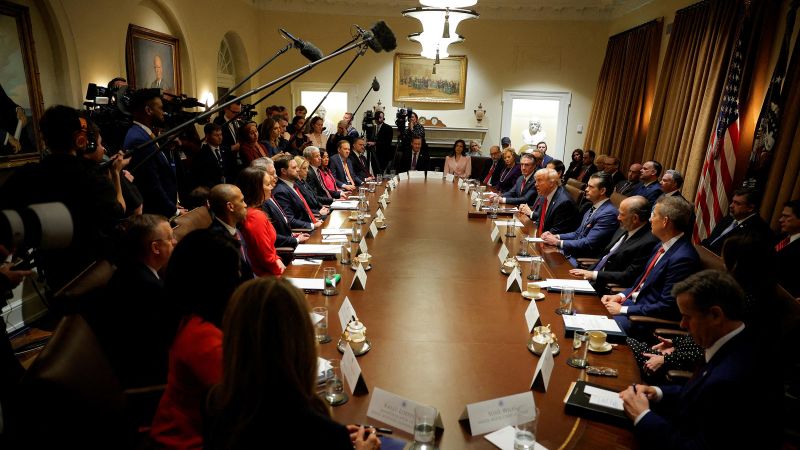CNN
—
After staffing the wealthiest presidential Cabinet in modern American history with energy and banking titans, President Donald Trump has spent his first three months in office boosting those industries while dismantling long-established guardrails against government corruption.
A CNN review of Trump’s actions as he approaches the 100-day mark of his presidency found that as his administration has slashed the federal workforce and shaken the global economy with tariffs, the president’s team has made changes that could also directly benefit his Cabinet members or their former companies.
At the same time, by gutting traditional oversight bodies and embracing historically lax ethics rules, Trump has enabled conflicts of interest and greased the revolving door between government and the private sector. At least eight nominees for executive branch positions would have been banned or had limited roles under previous administrations – including Trump’s first term – due to their recent work as lobbyists, according to an analysis by the watchdog Campaign Legal Center that was reviewed by CNN.
Some potential conflicts have played out in plain view – like when Trump used the White House lawn last month to produce what seemed like an elaborate ad for key adviser and top donor Elon Musk’s struggling Tesla brand. The Trump administration has also cleared the way for Musk’s Starlink business to win new government contracts.
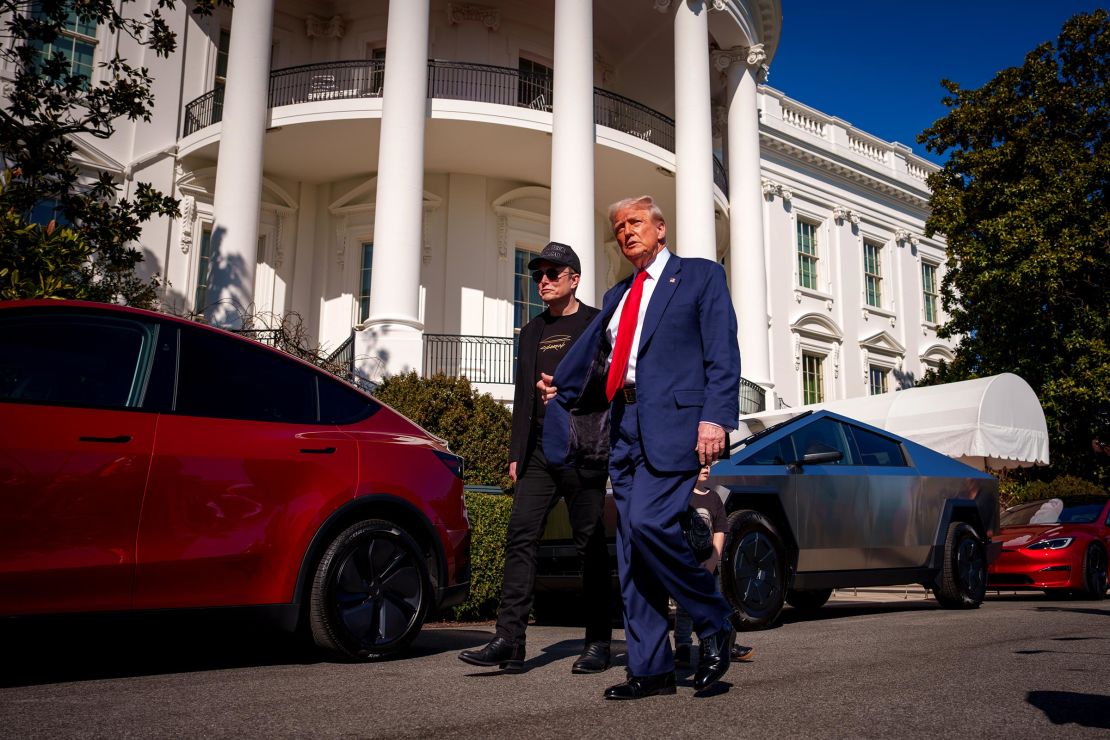
But other examples of possible conflicts are found deep in Cabinet members’ ethics reports, such as Energy Secretary Chris Wright’s disclosure that he would receive a million-dollar bonus – after his swearing-in – from the fracking company he founded, led and now plays a role in regulating.
Even as they’ve agreed to divest, some Cabinet members have found a loophole: giving control of certain assets to their adult children. Commerce Secretary Howard Lutnick handed the reins of his financial services firm Cantor Fitzgerald to his 27-year-old son, while Health and Human Services Secretary Robert F. Kennedy Jr. has said he would give his interest in litigation against a vaccine maker – part of an industry he is now tasked with regulating – to his adult son.
Some of Trump’s policies also could help his own business interests. By establishing a strategic Bitcoin reserve, the president is backstopping the value of the cryptocurrency, enriching existing holders of the asset, some of whom spent millions helping reelect the president. Meanwhile, Trump and his family have moved to expand their own crypto interests. And this week, Trump sent the value of his personal meme coin soaring by promising its top buyers a chance to dine with the president next month.
Many of the Trump administration’s early actions have pushed priorities that Republicans have sought for years, and the White House says its moves to slash regulations are needed to reduce spending and eliminate government inefficiency.
“The people elected me to do the job, and I’m doing it,” Trump said in March. “My administration will reclaim power from this unaccountable bureaucracy.”
But from cryptocurrency and energy policies to efforts as niche as rural internet access, some of the administration’s moves also closely align with the financial interests of his top advisers and the president himself.
“This administration seems entirely indifferent to ethics, and that contrasts certainly with the past several administrations, including Trump one,” said Richard Briffault, a Columbia University law professor who studies government ethics. “The level of complete indifference to it takes us back to before Watergate.”
In the wake of the Watergate scandal, Congress passed sweeping ethics legislation to hold the executive branch more accountable.
Within weeks of beginning his second term, Trump flouted many of those decades-old protections – including by firing more than a dozen inspectors general and dismissing the head of the government’s ethics watchdog. He also signed an order making it easier for lobbyists to join agencies overseeing industries they used to represent.
The United States has spent years building up an “ethics infrastructure,” Briffault said. “In less than 90 days, this administration has been tearing (it) down.”
Trump’s unprecedented moves come as his Cabinet includes some of the richest people to ever hold the reins of power in the federal government. Many came straight from positions of power in key industries.
CNN analyzed dozens of financial disclosures and ethics statements filed by presidential appointees to track the wealth and potential conflicts of interest among Trump’s Cabinet members. The disclosures offer a limited picture of nominees’ finances: Officials are only required to list their assets in broad ranges.
Still, Trump’s leadership team appears to eclipse the wealth of any previous Cabinet going back decades. Of 21 Cabinet members, seven reported holding at least $10 million in assets, and some are even billionaires.
Lutnick – who has been a Wall Street power player since the mid-1990s – has an estimated net worth of $3.1 billion, according to Forbes. That’s roughly 15 times as much as the combined maximum reported net worth of former President Joe Biden’s entire outgoing Cabinet.
Five Trump Cabinet members reported holding individual assets worth more than $50 million, the highest range on disclosure forms. And that doesn’t include Musk, the world’s richest person with a net worth of about $371 billion, who as a special government employee is not required to publicly report anything about his wealth.
While Biden filled his Cabinet mostly with bureaucrats and politicians, Trump’s team also includes former CEOs who ran major energy and financial services companies before joining him in Washington.
“We’re seeing industry officials coming into the executive branch in a way that we’ve never seen in past administrations, including the first Trump administration,” said Danielle Caputo, senior ethics counsel for the Campaign Legal Center.
While supporters of Trump’s efforts say industry expertise helps officials better understand the fields they regulate, ethics watchdogs fear actions undertaken by highly-connected officials could benefit their former companies and colleagues instead of the American public.
Some moves could particularly benefit the super-wealthy. Musk’s Department of Government Efficiency, for instance, has taken a chainsaw to the Internal Revenue Service, which includes a unit that audits America’s ultrawealthy. Data obtained by CNN and first reported by the International Consortium of Investigative Journalists revealed that the Global High Wealth unit was hit by layoffs at a far higher rate through March of this year than the IRS as a whole.
Trump has also rescinded a Biden-era executive order creating ethics requirements for political appointees.
Members of the past three administrations — including those who worked under Trump during his first term — previously had to commit not to accept gifts from lobbyists. They were also banned from working on issues they lobbied on in the two years before their appointment, and after leaving government, couldn’t lobby on behalf of industries they’d recently regulated.
Those rules would have banned or limited the roles of eight Trump nominees, including three officials tapped for Environmental Protection Agency roles who lobbied for fossil fuel groups in recent years, according to an analysis by Campaign Legal Center shared with CNN.
Additionally, CLC found Trump has named at least six political appointees to serve as senior ethics officials, a role normally held by nonpartisan career officials.
Inspectors general across more than a dozen different agencies were fired during Trump’s first week in office. The IGs act as independent watchdogs, and the president is supposed to provide a 30-day notice to Congress before removing them, which Trump failed to do. Trump defended the move by suggesting some IGs had been “unfair” and firing them was “a very standard thing to do.”
On the campaign trail, Trump promised to make America the “crypto capital of the planet.” He kicked off his second term with moves to boost the crypto industry such as establishing a national bitcoin reserve, dissolving a Biden-era task force that investigated crypto criminals, installing a Musk ally as “crypto czar” and revoking a banking rule that discouraged financial institutions from owning crypto.
At the same time, Trump and his family have gotten deep into crypto by launching a new firm and the president’s own meme coin, a digital asset that has no underlying value and trades largely on hype. Trump also installed Lutnick, a banker who before his swearing-in was overseeing more than $1.5 billion in crypto-related investments, as his commerce secretary.
Lutnick has long pushed to legitimize bitcoin and other cryptocurrencies. Last October, while he was still CEO of Cantor Fitzgerald, he told a podcast host he had “hundreds and hundreds of millions” of exposure to bitcoin, presumably through crypto assets held by his firm.
Cantor Fitzgerald is now run by his son, which ethicists say leaves Lutnick with an improperly close tie to the firm’s success.
“By turning it over to a family member, you may not benefit directly, but you surely have an interest in the well-being of your child,” said Briffault.
Cantor Fitzgerald didn’t respond to requests for comment.

Meanwhile, Trump’s sons launched a digital currency company, World Liberty Financial, in 2024, and took an ownership stake in a bitcoin mining venture called American Bitcoin last month. Trump’s own media company announced plans earlier this year to potentially buy bitcoin and other cryptocurrencies.
At least eight top officials in the executive branch disclosed crypto holdings in their financial disclosures, although some agreed to divest the assets. Transportation Secretary Sean Duffy, HHS Secretary Kennedy and Center for Medicare & Medicaid Services Administrator Mehmet Oz each reported owning more than $500,000 in crypto assets.
An HHS spokesperson told CNN that “Secretary Kennedy continues to adhere to all ethical and legal requirements.”
So far, the Trump administration’s crypto moves haven’t led to a boom in valuations for digital assets. While the price of bitcoin, a bellwether for the $3 trillion crypto market, skyrocketed nearly 50% between Trump’s election victory and inauguration, it has fallen about 9% since then, mirroring broader stock market declines.
Still, Eric Talley, a Columbia University professor who studies corporate law, said he saw the Trump administration’s efforts to promote crypto, and specifically the strategic bitcoin reserve, as “particularly suspicious.”
“The economic stakes — if you were a heavy holder of crypto — would be huge and profoundly positive if you could cause the US government to essentially guarantee a big chunk of the stability of the market of at least some of the crypto issuances,” he said.
During his time in the private sector, former fracking executive Chris Wright was a zealous and vocal critic of government regulations meant to curb global warming. His company Liberty Energy filed a lawsuit that challenged a federal rule requiring companies to disclose details about greenhouse-gas emissions. In one video he posted on social media, Wright declared, “There is no climate crisis.”
Now, as energy secretary, Wright has authority to reverse some of the policies he railed against as Liberty’s CEO.
Wright has ordered the department to “build energy infrastructure and remove barriers to progress,” among other steps, to achieve US “energy dominance.” Under his leadership, the agency has ceased its pursuit of a net-zero carbon future, cut fossil fuel regulations and accelerated numerous natural gas export projects.
Inside the department, Wright has alarmed some staffers with his embrace of fracking over other energy projects. Four current Department of Energy employees, who spoke to CNN on the condition of anonymity for fear of retribution, described a general attitude of hostility toward most renewable energy. One staffer pointed to webpages that once promoted solar energy and have now been taken offline, and other employees described circulating lists of renewable energy programs that could be on the chopping block.
Having a former fracking executive run the energy department is “absolutely a conflict of interest,” one staffer said.
Some of Wright’s former Liberty colleagues have also followed him into the department, including his current scheduling director, one of his advisers and a Liberty board member who has been nominated to serve as an assistant energy secretary.
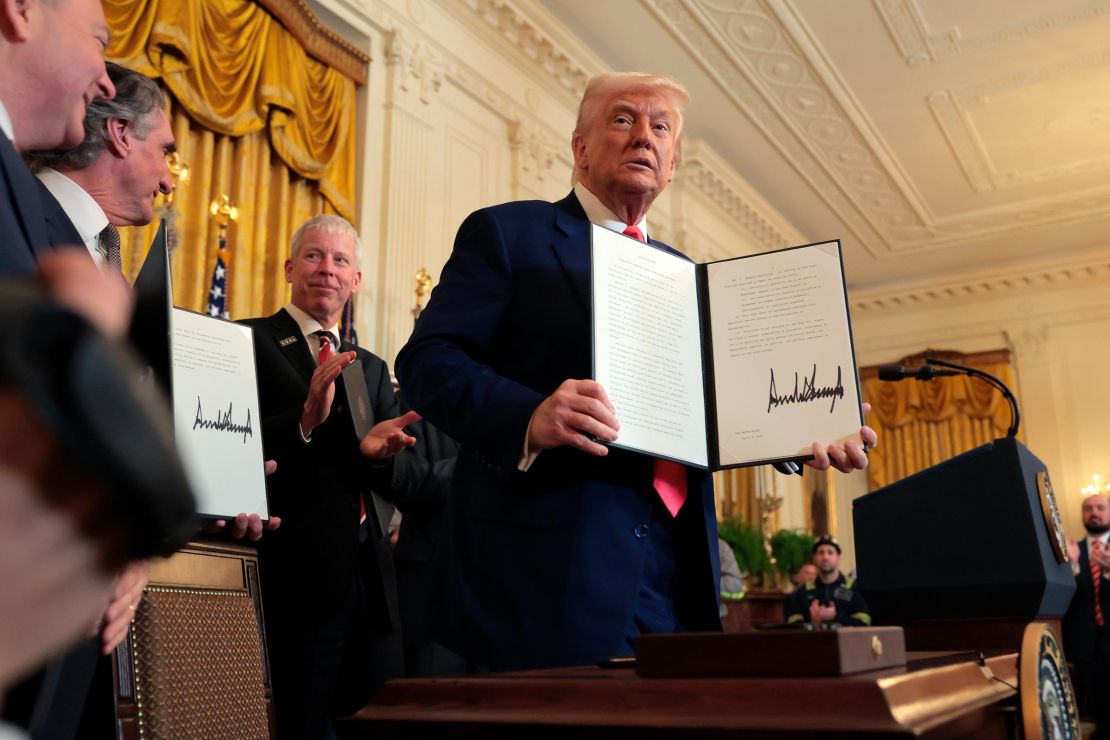
In the short term, falling oil prices due to economic turmoil under Trump could hurt fracking companies. But leaders at Wright’s former company have applauded the policy shifts. “We have an administration now that is working hard to remove some of the impediments that have been challenges,” Liberty Energy CEO Ron Gusek said at the New York Stock Exchange in March. “Those things give us a path forward to invest in our business.”
According to his ethics documents, Wright owned about $54 million worth of Liberty stock as of February, though disclosures show he sold off Liberty shares in recent weeks and moved money into general investment funds. He also disclosed that he would receive a roughly $1 million performance bonus for his work last year from the fracking company in March, after his swearing-in. A Liberty filing last month stated he received his bonus.
A Liberty spokesperson said, “To our knowledge, there has been no communication with Secretary Wright or any representative from the Department of Energy regarding Liberty Energy business.”
While the fossil fuel industry cheers Wright’s successes, some communities that expected financial help from the Department of Energy have faced roadblocks. Under a program funded by the bipartisan infrastructure law, for example, the department planned to disperse $500 million in grants to help schools in disadvantaged regions across the US improve their energy efficiency.
But multiple school district administrators told CNN that since Wright took over, the department has largely stopped communicating with them about federal funding from the program. Now, some districts fear they won’t receive all the money they were promised.
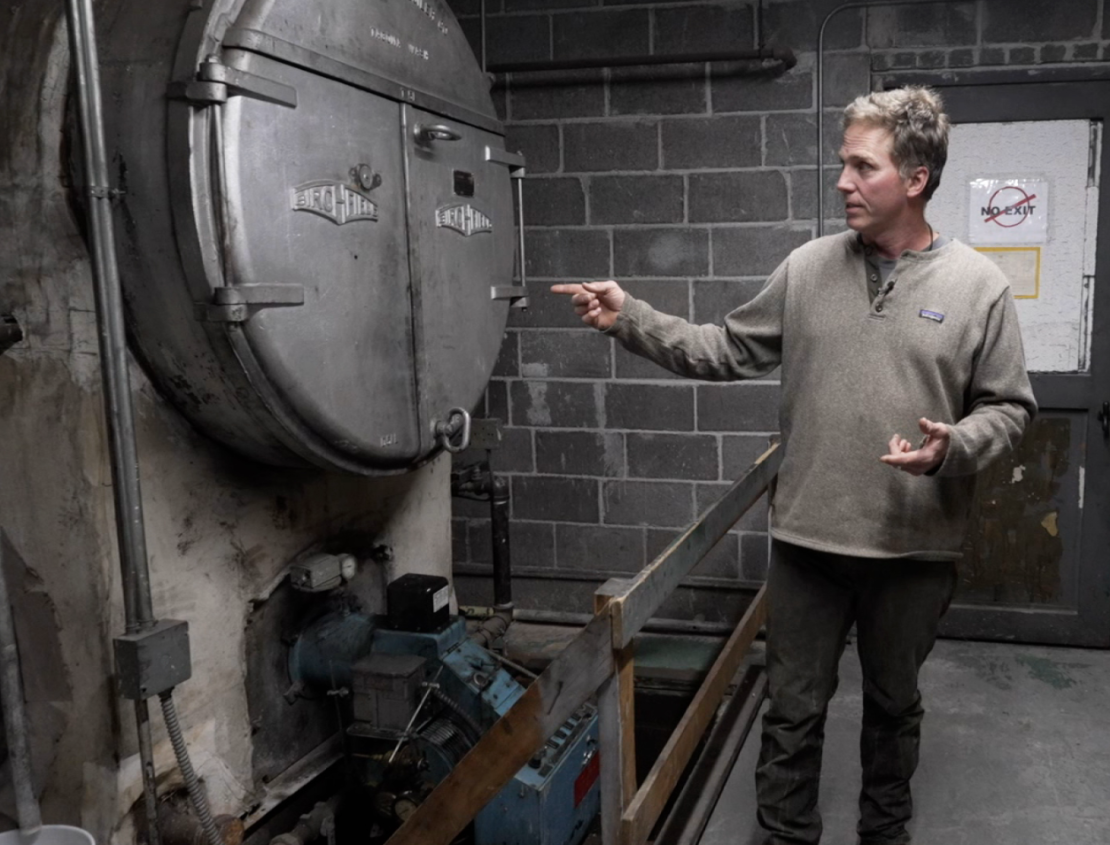
Mosier Community School, a public charter school in a rural Oregon county that voted for Trump, was awarded a roughly $870,000 grant from the program. That money could help replace the school’s unreliable century-old heater and windows that are currently held closed with tape, said Brent Foster, who leads a committee to upgrade the school’s infrastructure.
This year, the DOE has canceled meetings with the school about the grant and has not been processing requests related to the project, according to Foster, who said he doesn’t know whether the funds will ever come through.
Winning the grant “felt like a miracle,” Foster said. “The idea that the federal government would sign a contract… then pull the rug out from under us, it’s difficult to understand.”
An Energy Department spokesperson said the agency is reviewing all activities to ensure they follow the law and align with the administration’s priorities. “President Trump’s administration is advancing a strategy of energy addition – embracing all forms of energy that are affordable, reliable, and secure,” said the spokesperson, who added that Wright has complied with department ethics requirements.
The federal government has earmarked tens of billions of dollars to close the digital divide, connecting millions of rural Americans to fast, reliable internet. And for years, Musk’s SpaceX has tried to become eligible for the funds, at times without success.
In 2022, the Federal Communications Commission rejected a nearly $900 million grant application by Starlink, SpaceX’s satellite internet system, saying the company failed to show it could deliver on the promised service.
Similarly, the $42 billion Broadband Equity Access and Deployment Program was specifically designed to prioritize the gold standard of broadband internet – fiber-optic cables – over other technologies such as satellite service.
But that changed rapidly after Trump took office. Lutnick announced last month that the Commerce Department would end “woke mandates” and “favoritism towards certain technologies.” In practice, that means potentially opening up billions in funding for satellite internet companies.
Lutnick’s directive could enable Musk’s company to earn up to $20 billion from the amended BEAD program, according the Wall Street Journal. Today, Starlink is uniquely positioned to provide commercial satellite-based internet. However, other companies, including Amazon, may compete for BEAD grants in the future.
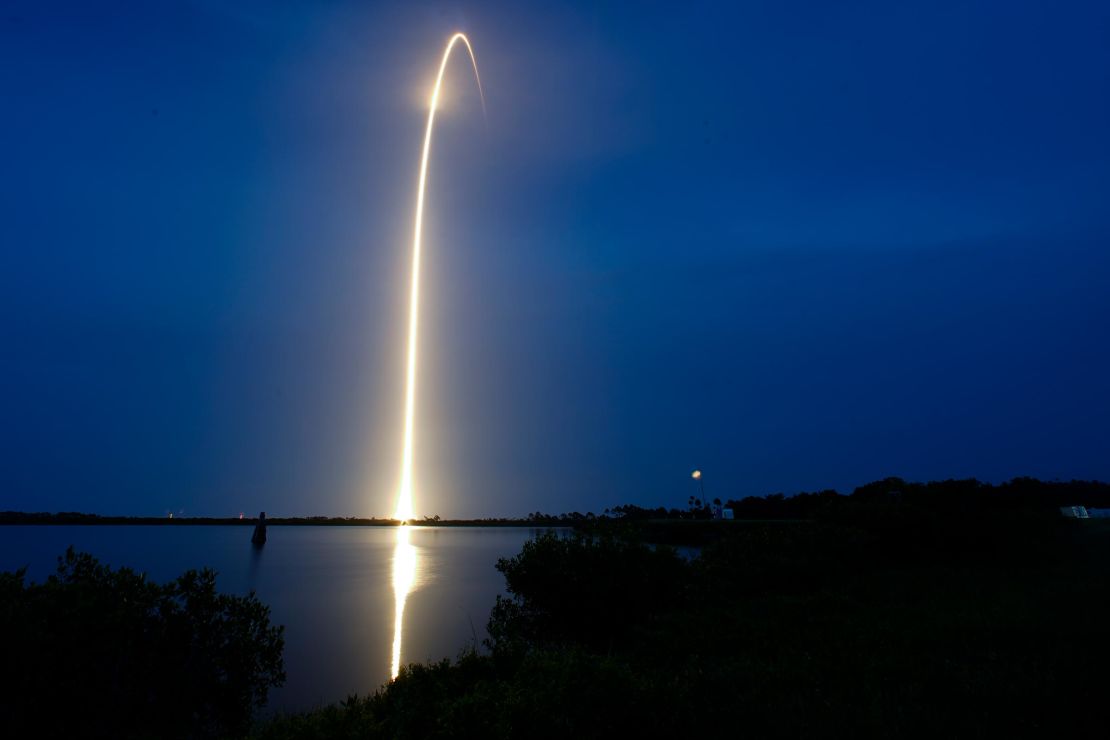
Musk has long criticized the federal government’s rural internet efforts, claiming that had the FCC not rejected Starlink’s grant application in 2022, “it would probably have saved lives in North Carolina” after Hurricane Helene decimated the area. The BEAD program, Musk said, is an “an outrageous waste of taxpayer money” that is “utterly failing to serve people in need.”
SpaceX did not respond to requests for comment.
Experts say satellite-based internet service could play a useful role in connecting low-density remote areas. But many argue a fiber-optic connection is more reliable and weather resistant than what satellite service can offer today.
“Fiber can handle an almost unlimited amount of bandwidth. Fiber is scalable in terms of speed. Fiber is what we call ‘future proof,’” said Christopher Ali, a professor of telecommunications at Penn State University.
Lutnick’s move to change the program is now prolonging delays in getting shovels in the ground, even as the GOP has blasted the Biden administration over its failure to spend the money more quickly. Senate Majority Leader Sen. John Thune and 12 additional Republican senators, for example, have said the program has “onerous regulations” and moves slowly due to “unnecessary government interference.”
The Commerce Department didn’t respond to requests for comment.
Some states with approved BEAD proposals are waiting for the green light from the federal government before starting work while others are amending their proposals.
A final draft proposal dated March 2025 from West Virginia obtained by CNN details a plan to bring a fiber-optic internet connection to every resident in the state. But after Gov. Patrick Morrisey met with Lutnick later that month, he announced West Virginia would revise the proposal to “evaluate a broader range of technology options, including satellite.”
“The West Virginia Broadband Enhancement Council has always supported fiber deployment and continues to do so,” said Bill Bissett, who heads up the council.
“Every day we delay is another day that West Virginians who are underserved or unserved will not have access to this critical resource,” he added.
Because of Lutnick’s change, government officials will “re-run a process they’ve already completed solely to put satellite service in places that were going to get fiber,” said Evan Feinman, who until recently oversaw the rollout of the BEAD program. “That service will be dramatically slower, less reliable in bad weather … and will cost at least $800 more per year (per household) than the fiber connections would have been.”
The change in direction of the BEAD program is the “poster child for why people should be concerned about conflicts of interest” in this administration, said Briffault, the Columbia law professor, who spoke about how members of Trump’s inner circle could be putting a thumb on the scale.
“You cannot be confident that the decision is being made on the policy merits, as opposed to the influence of a self-interested individual who stands to make a ton of money on it,” he said.
CNN’s Yahya Abou-Ghazala and Anna-Maja Rappard contributed to this report.

